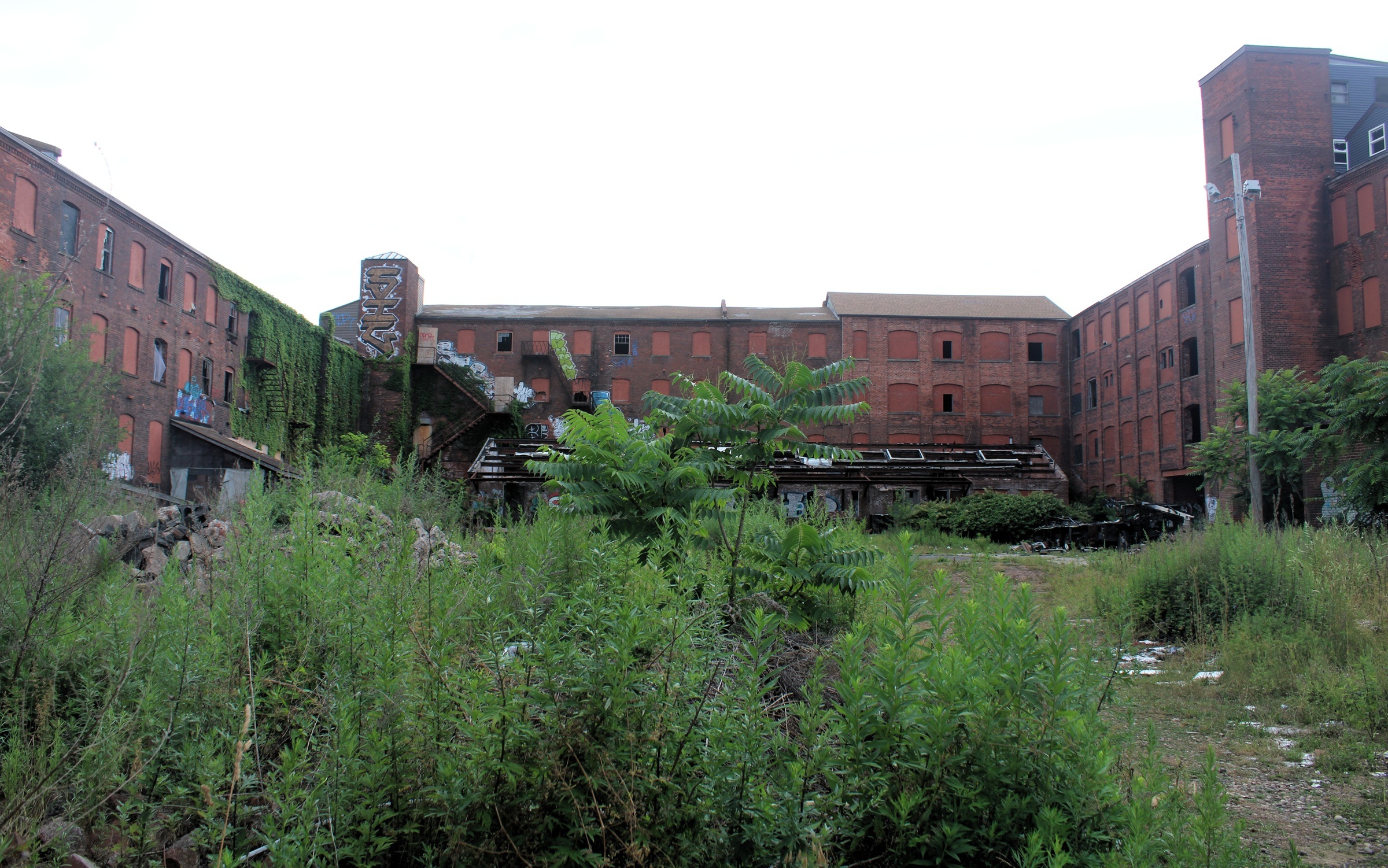
The view of the ex-clock factory at 133 Hamilton.
A federal bankruptcy judge on Friday delayed her decision on whether to appoint an interim trustee to oversee the dilapidated Hamilton Street clock factory, citing unresolved questions about insurance coverage, funding availability, and site safety.
The motion for a trustee stems from broader efforts by creditors, who have collectively invested a seven-figure sum in the property’s redevelopment, to wrest control of the former factory at 133 Hamilton St. from its current owner.
Those efforts began on June 26, when creditors petitioned the U.S. Bankruptcy Court of Connecticut to place the owner, Taom Heritage New Haven LLC, into involuntary Chapter 7 bankruptcy. The holding company’s primary owner is Scott Reed of the Oregon-based Reed Community Partners. Taom has owned the ex-factory property since 2018.
If the petition for bankruptcy is approved, the creditors would be able to sell the company’s sole asset, the building at 133 Hamilton, without Reed’s approval. That would allow them to complete a $4.5 million purchase-and-sale agreement with the Housing Authority of New Haven, signed in 2024 but repeatedly delayed by Reed’s company’s failure to complete environmental remediation and secure the site.
On Friday, Judge Ann M. Nevins heard arguments on a small piece of that effort: whether to appoint a Chapter 7 interim trustee to manage the property before July 18, the deadline for Taom Heritage to respond to the bankruptcy petition.
A motion for an expedited appointment was submitted on July 3 by Attorney Jeffrey Hellman on behalf of creditors C. William Kraus, Rescue 1 Pest and Termite Control LLC, Decontamination Decommissioning and Environmental Services LLC, and TSJ Inc.
More than a dozen people attended the hearing on the 18th floor of 157 Church St., either in person or via Zoom. Representatives of creditors Triton, Capital for Change, and Decontamination Decommissioning and Environmental Services LLC joined the proceedings, as did Kraus himself.
In less than 45 minutes, Judge Nevins recommended that the parties recess to iron out the plan’s details. She said she lacked the “ingredients” to order an expedited appointment.
“This is an extraordinary remedy that you’re asking for today,” said Nevins. Securing a property with squatters is “a dangerous thing for a trustee to do,” requiring some type of insurance and a bond to indemnify the owner. “There needs to be a path to do that,” she insisted.
Those remarks echoed objections raised earlier in the hearing by Assistant U.S. Trustee for Region 2 Kim McCabe, who opposed the expedited appointment.
In a July 9 affidavit, McCabe and U.S. Trustee for Region 2 William Harrington wrote, “The burden to demonstrate that necessity of appointing an interim trustee is a difficult one and does not appear to have been met by the contents of the [petitioning creditors’] Motion.” Because the ex-factory has been deteriorating for years, they argued, the need for intervention was not as urgent as the creditors claimed.
They also raised concerns about funding. “As it appears that [Taom Heritage] has no funds and no other assets,” they wrote, “should an interim trustee be appointed…the trustee would have no funds to meet the Petitioning Creditors stated goal of preserving the Property.” The affidavit further questioned a trustee’s ability to obtain insurance given the condition of the building.
At Friday’s hearing, Hellman pushed back, warning that without court intervention, the property would continue to erode in value, impeding the creditors’ ability to recover their funds. He pointed to reports of squatters, multiple fires over the past year, and an upcoming tax foreclosure auction. (According to Ilan Markus, counsel retained by the City of New Haven, the property’s unpaid real estate taxes total $450,000).
Attorney Bruce Kraus echoed Hellman’s concerns, noting that according to his brother Bill, who managed the property for years, the building’s occupants have built barricades to protect their belongings and regularly light fires to keep warm.
Kraus also said the creditors had secured funds for security and remediation. Nevins questioned whether the proposed amount would be sufficient.
Though Reed did not appear with legal counsel, he joined Friday’s hearing via Zoom. Hellman said Reed had indicated he plans to contest the bankruptcy petition.
That move, Hellman warned, could significantly delay the appointment of a trustee, allowing the property to deteriorate even further.
“You’re asking me to, before [Reed] is represented by counsel, send a civilian trustee into a dangerous situation in the property, and to tell people who have put up barricades to leave,” said Nevins. Without more clarity around the bond, required under Chapter 7 bankruptcy law, or the source of funding for the trustee, she said she was reluctant to issue the order.
After an hour-long recess, the parties returned to request a continuance so they could answer Nevins’s questions related to insurance and funding. McCabe suggested also using the time to contact the city’s Livable City Initiative (LCI), which could help secure the site.
Although a $4.5 million purchase-and-sale agreement with the Housing Authority of New Haven remains on the table, no representative from the housing authority attended Friday’s hearing. They did not respond to requests for comment in time for this article.
Markus, appearing for the City of New Haven, said the city did not take a position on the trustee motion but emphasized that it is eager in seeing the property stabilized as soon as possible.
Another hearing is schedule for Tuesday at 10 a.m. in Nevins’s courtroom.